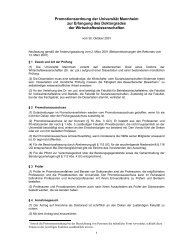The returns to cognitive and non-cognitive abilities in Germany
The returns to cognitive and non-cognitive abilities in Germany
The returns to cognitive and non-cognitive abilities in Germany
You also want an ePaper? Increase the reach of your titles
YUMPU automatically turns print PDFs into web optimized ePapers that Google loves.
e less suited <strong>to</strong> higher level jobs that are more complex <strong>and</strong> supply more stress (Spec<strong>to</strong>r et<br />
al., 1995).<br />
Extraversion is a broad construct that <strong>in</strong>cludes a range of fac<strong>to</strong>rs but is typically<br />
thought <strong>to</strong> consist of sociability. As Judge et al. (1999, p. 624) po<strong>in</strong>t out, “extraverts tend <strong>to</strong><br />
be socially oriented (outgo<strong>in</strong>g <strong>and</strong> gregarious), but also are urg<strong>in</strong>g (dom<strong>in</strong>ant <strong>and</strong> ambitious)<br />
<strong>and</strong> active (adventuresome <strong>and</strong> assertive)”. Furthermore, extraverts are more likely <strong>to</strong> take<br />
on leadership roles <strong>and</strong> <strong>to</strong> have a greater number of close friends which are qualities that are<br />
of advantage <strong>in</strong> bus<strong>in</strong>ess environments.<br />
Conscientiousness is related <strong>to</strong> an <strong>in</strong>dividual's degree of self-control, the need for<br />
achievement, order, <strong>and</strong> persistence. Put differently, conscientiousness refers <strong>to</strong> one’s<br />
will<strong>in</strong>gness <strong>to</strong> work hard, <strong>to</strong> be responsible <strong>and</strong> careful, <strong>and</strong> planful <strong>and</strong> organized (Costa et<br />
al., 1991). It is thus unsurpris<strong>in</strong>g that conscientiousness has previously been shown <strong>to</strong> be a<br />
valid predic<strong>to</strong>r of job performance. 3<br />
While the above mentioned personality traits more or less allow dist<strong>in</strong>ct hypotheses<br />
regard<strong>in</strong>g labor market success, the rema<strong>in</strong><strong>in</strong>g facets, openness <strong>to</strong> experience <strong>and</strong><br />
agreeableness, may be related either way <strong>to</strong> job performance <strong>and</strong> other labor market<br />
outcomes. For example, <strong>in</strong>dividuals who are open <strong>to</strong> new experiences typically are flexible,<br />
creative, <strong>and</strong> <strong>in</strong>tellectually orientated. This may on the one h<strong>and</strong> be advantageous <strong>to</strong> career<br />
success. On the other h<strong>and</strong>, openness is also related <strong>to</strong> au<strong>to</strong>nomy <strong>and</strong> <strong>non</strong>-conformity which<br />
may be a h<strong>in</strong>drance <strong>to</strong> labor market success. Similarly, agreeable <strong>in</strong>dividuals who are more<br />
likely cooperative <strong>and</strong> likeable may benefit from these characteristics <strong>in</strong> teamwork sett<strong>in</strong>gs<br />
or <strong>in</strong> occupations with a higher frequency of cus<strong>to</strong>mer contacts. <strong>The</strong>re however is also a flip<br />
side of agreeableness s<strong>in</strong>ce, as Judge et al. (1999, p. 625) put it, “extremely agreeable<br />
<strong>in</strong>dividuals may sacrifice their success <strong>in</strong> pleas<strong>in</strong>g others”.<br />
6















